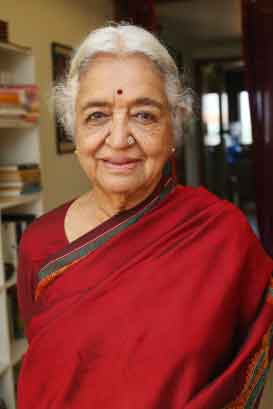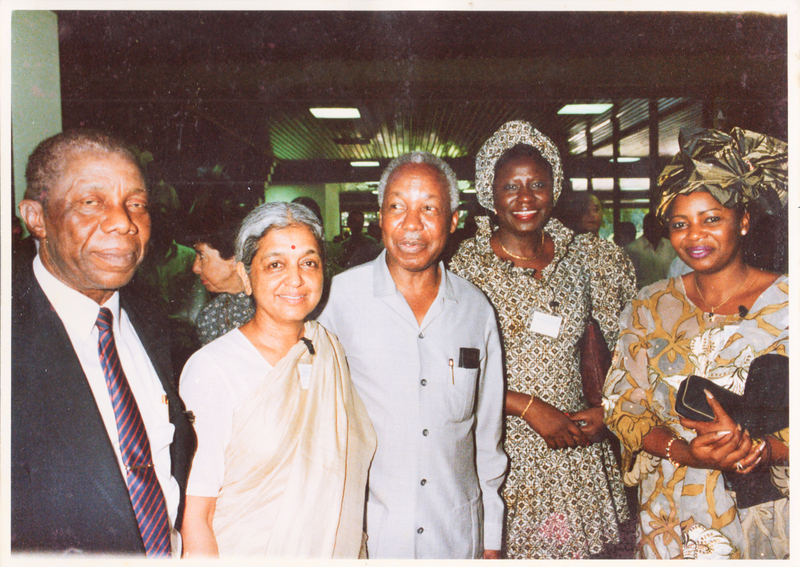‘Follow your dreams and don’t be frightened of orthodoxy’

A woman who at eighty-eight brought out her autobiography based on the urgings of among others, Alice Walker, author of the Pulitzer Prize winning novel, The Colour Purple , and Doris Lessing, the Nobel Laureate — only much later. Like Lessing’s The Golden Notebook, her biography is called The Brass Notebook. Does it talk anti-war or feminism or womanism? I am not sure. What it does show is a woman who despite being surrounded by patriarchal norms managed to live her life as she wanted without resorting to schools of ‘isms’ or feeling injured. In the process, she met many great people and tried to bring in changes or reforms.
Devaki Jain, born in 1933, graduated in economics and philosophy from St Anne’s College, Oxford and is an Honorary Fellow of the college. She is a recipient of the Padma Bhushan (2006) and an honorary doctorate from the University of Westville, Durban, South Africa.

Needless to say the best introduction to her work and her person comes from well-known feminist journalist, Gloria Steinem: “Your heart and world will be opened by reading The Brass Notebook the intimate and political life of Devaki Jain, a young woman who dares to become independent even as a country of India does. Because she’s also my oldest friend I can tell you there is no one like her, yet only here in her writings have I learned the depth, breadth and universality of adventures.”
The interview probably reinforces her non-conformist outlook. In an age when intellectuals bicker over terminology and social media becomes the fulcrum of our lives, she lives by her convictions. Despite writing an absolutely gripping autobiography, she has revealed only a bit of herself. Through the interview, I tried to entice more but I got only a very brief glimmer. Her autobiography painted a liberal, liberated and open thinker who fearlessly fought her way against patriarchal and colonial mindsets. In this exclusive, I invite you to savour her spirit at a stage in life when most talk mainly of geriatric issues. Devaki Jain for you —
You were a very independent lady for your times. Could you find parallels of women like yourself in diverse cultures?
Women have been revolutionaries, radical thinkers, resistance leaders, dissenters for centuries. There are not many records of this but one of my colleagues found that there were groups of women, for example, in China even as far as the 12th century who were dissenters. Therefore, the knowledge may not have been recorded but striking for independence and striking for justice has been a part of women’s lives for centuries.
What drove you to be as you were? What made you feel that marriage was not the ultimate aim of all existence in the 1950s and 1960s?
(a)What drives people to do things differently? This is not an easy question to answer, people are born differently with different aspirations and different nervous systems. It is like asking an artist what helped you to be such a brilliant artist. Such questions are not appropriate.
(b) I think this question is badly framed that I felt that marriage was not the ultimate aim, it was not like that. It was just that I felt there were other things that I wanted to do.

permission from Devaki Jain
& Speaking Tiger Books
How supportive was your family, especially your father, of your sense of independence?
My father was an enigma, while he wanted to submit to orthodoxy, he was also very respectful of those who wanted to do things differently. So, in a sense, I think he was supportive of my desire for independence.
You did face some amount of familial sexual harassment. Did it scar you for life? How did you get over the trauma?
My uncle’s sexual assault on me did not scar me for life, there was no particular need to get over the trauma. In a situation of living in cloisters with family bounds there is no space for lifelong traumas.
You spoke of how funding went inadvertently hand in hand with a different kind of colonial outlook. Would you say that is still true?
No, currently I think both the donors and the receivers have understood the difference and respect the difference.
Womanism is a term you have spoken of in your book. How is this different from feminism in your perspective?
I was basically supporting Alice Walker’s definition and I support her perspective. Please refer to my quotation from Alice Walker*.
[*Alice Walker quote from Pg 173-174, The Brass Notebook, Speaking Tiger, 2020: “As long as the world is dominated by racial ideology that places whites above people of colour, the angle of vision of the womanist, coming from a culture of colour, will be of a deeper, more radical penetration. This is only logical. Generally speaking, for instance, white feminists are dealing with the oppression they receive from white men, while women of colour are oppressed by men of colour as well as white men, as well as by many white women. But on the joyful side, which we must insist on honouring, the womanist is, like the creator of the word, intent on connecting with the earth and cosmos, with dance and song. With roundness, thankfulness and joy. Given a fighting chance at living her own life, under oppression that she resists, the womanist has no or few complaints. Her history has been so rough—captured from her home, centuries of enslavement, apartheid, etc—she honours Harriet Tubman by daily choosing freedom over the fetters of any internalized slavery she might find still lurking within herself. Whatever women’s liberation is called, it is about freedom. This she knows. Having said this, I have no problem being called “feminist” or “womanist.” In coining the term, I was simply trying myself to see more clearly what sets women of colour apart in the rainbow that is a world movement of women who have had enough of being second–and third–class citizens of the earth. One day, if earth and our species survive, we will again be called sacred and free. Our proper names.”]
Do you think women’s issues across the world are similar? How should they be dealt with?
It is believed that women’s oppression comes from patriarchy which of course is worldwide. I do not think I can answer the second part of the question – “how should it be dealt with?” — except writing three other books.

a member of the South
Commission. With permission
from Devaki Jain & Speaking
Tiger Books
You have spoken of how the South Commission fell through. Can you tell us why? Is this what happens very often?
The South Commission fell apart because of a failure of solidarity between the south countries. It was a political statement to join the South together as an economic platform. When it failed, it failed all that.
You tried to bring many changes for the welfare of women across India and beyond. Will you tell us a bit about the perceived problems and solutions that we could find?
I do not think I attempted to bring changes for the welfare of women. I think I was basically pointing out the contribution that women made to the economy and how they were being discriminated against.
What are your future plans, presuming you are going to be a grand dame of 150 years?
I would like to write, write and write.
What would be the advice you would like to give young women living in today’s world?
Follow your dreams and don’t be frightened of orthodoxy.
Thank you for giving us some of your time.



All the photographs are published with thanks to the author, Devaki Jain, and the publisher, Speaking Tiger Books.
This has been an online interview conducted by Mitali Chakravarty.
Originally published by Borderless Journal
IF YOU LIKED THE ARTICLE SUPPORT PEOPLE’S JOURNALISM










































